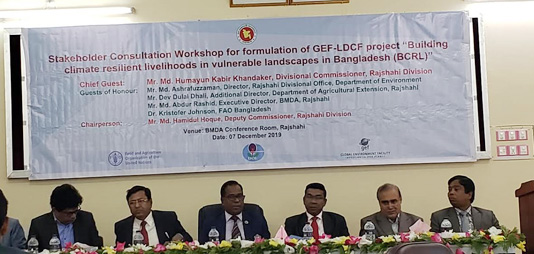RAJSHAHI, Dec 7, 2019 (BSS)- Scientists and researchers at a participatory discussion here today called for promotion of climate resilient livelihoods in the vast Barind tract as the adverse impact of climate change has been posing a serious threat to the living and livelihood condition of the marginal and low-income groups of people.
They mentioned that climate change is already negatively impacting smallholder agricultural production and productivity, necessitating urgent and effective measures for building adaptive capacities, methods and technologies.
They came up with the observation while taking part in group discussions of a daylong consultation workshop for formulation of Global Environment Facility (GEF) and Least Developed Countries Fund (LDCF) at the conference hall of Barind Multipurpose Development Authority (BMDA) in Rajshahi city. Department of Environment (DoE) under its ‘Building Climate Resilient Livelihoods in Vulnerable Landscapes in Bangladesh’ project hosted the workshop in association with Food and Agricultural Organization (FAO).
Commissioner of Rajshahi division Humayun Kabir Khandakar addressed the opening session as chief guest while DoE Divisional Director Md Ashrafuzzaman spoke as guest of honour with Deputy Commissioner Hamidul Haque in the chair.
BMDA Executive Director Engineer Abdur Rashid and Dr Kristofer Johnson from FAO Bangladesh also addressed the opening session.
Most of the participants in the workshop unanimously observed that the poor, often ethnic people households are the most vulnerable to climate change impacts, lacking the resources, services and systems that will enable them to cope and adapt.
To mitigate the odd situation, capacity must be strengthened at individual, household, community and local government institutions.
During his keynote presentation, Md Afrauzzaman, Project Formulation Specialist of FAO, illustrated the salient feature of the project that will improve the resilience of community livelihoods to climate change through diffusion and scale-up of adaptation technologies.
He said the proposed project will boost climate resilience by supporting cross-sectoral collaboration to enable effective mainstreaming, gender-responsive adaptation plans, value chain adaptation plans, and public-private partnership agreements.



